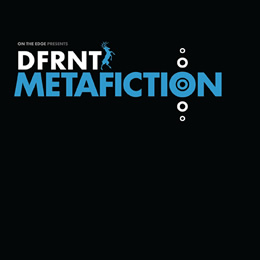
DFRNT
Metafiction
(On the Edge; 2009)
By Jack Moss | 18 November 2009
In theory, dubstep is a genre where all the rules are still being written. Barely half a decade old and far from entrenched in the rigid sub-genres and scenes that plague other electronic styles, it’s the first genuinely new dancefloor frontier since the early ‘90s. Dubstep is little more than a rhythmic concept, but despite being a blank musical canvas framed only by that particular beat-skeleton, it has quickly separated into two distinct camps: on one side there’s the downtempo material where experimentation is commonplace; the other side is dancefloor-orientated, now beholden to a clear set of sounds, templates, and rules. It’s exactly the same scenario that occurred in jungle fifteen years ago where an ideological war was waged between progressive junglists experimenting with jazz and “atmospheric” drum ‘n bass and the hardcore massives who took jungle down the militant, aggressive, and ultimately formulaic path.
And just like jungle, the genre has served its time in the underground to, now, explode in popularity and trendiness. (You can buy a burger in Canada and hear dubstep on the radio.) When a genre becomes well known to the point of being ubiquitous, it’s inevitably plagued by bad DJs, so—just like jungle—experiencing dubstep on the floor rapidly descends to wearily counting the bars until that bass sound, that snare, or that breakdown reoccurs. In jungle, despite what ardent genre fans claim, the dancefloor ultimately won: most contemporary drum ‘n bass is dominated by the same bass lines, beat textures, and structures, devoured by devotees and largely ignored by the wider scene. Dubstep’s fate is not sealed yet, but if we’re still to be surprised and engaged by this style five or ten years down the line, we need artists like DFRNT to succeed.
There are times during Metafiction, the Scottish producer’s debut album, where you question whether you’re still listening to dubstep, and, if so, what that even means in 2009. Which is most definitely a good thing. For Alex Cowles, the man behind the moniker, dubstep is less a genre than it is a creative philosophy, one that allows the album’s most ambient pieces to merge seamlessly with its most danceable moments.
As with almost all records like it, Metafiction‘s predominant characteristic is bass, and, from there, the synaesthetic corollary: darkness. Enveloping low-end timbres and subterranean percussive thumps form the bedrock of the album, but what separates it from the other ambient dubstep is how Cowles provides counterpoint to this bleakness with warmer melodies and pads flirting around the mid-range. The tracklist itself provides a metaphor for this internal dichotomy of light and shadow, with a semantic strand of heat and cosiness (“Wake Up”; “...Warmest”; “Lounge”; “Sound Asleep”) that runs alongside another of coldness and desolation (“Landscapes”; “Dark…”; “Winter”; “Decay”). The effect is an album that encapsulates a pitch-black crepuscule viewed from an orange bedroom window; the benefit is a duality that imparts depth and nuance to each listen. The 70 bpm bass thuds that sound achingly sparse on one listen become tranquil heartbeats over the next.
Occasionally Cowles pushes the balance too far and the dulcet topside becomes a little too maudlin for comfort: witness the overly twee flute solo on “Therapy” or the delay-soaked piano motif on “Landscape.” For the most part, however, the album’s problem is one more of structure, or the lack thereof, than cloying tendencies. Metafiction may be intended as an evocative mood piece, but the tracks drift somewhat aimlessly; the tracklist suggests an underlying narrative from “Wake Up” to “Sound Asleep,” but the album doesn’t really go anywhere from start to finish.
Though it looks like a bonus disc on paper, the second CD is the real deal-maker. Through a combination of original productions and third party remixes of album tracks, Cowles finds a middle ground between the airy atmosphere of the first disc and the down-to-earth beats of the clubs. The injection of purposeful rhythm tightens the pieces up immeasurably while enough of the distinctive constitution of the main disc is retained to keep things fresh but familiar, even cohesive. So, while it certainly isn’t perfect and it would probably benefit from being trimmed to a leaner and meaner single disc, Metafiction is another step forward for the genre, deserving of the attention from anyone who thought they had dubstep figured out, and from a whole load of other people besides.





